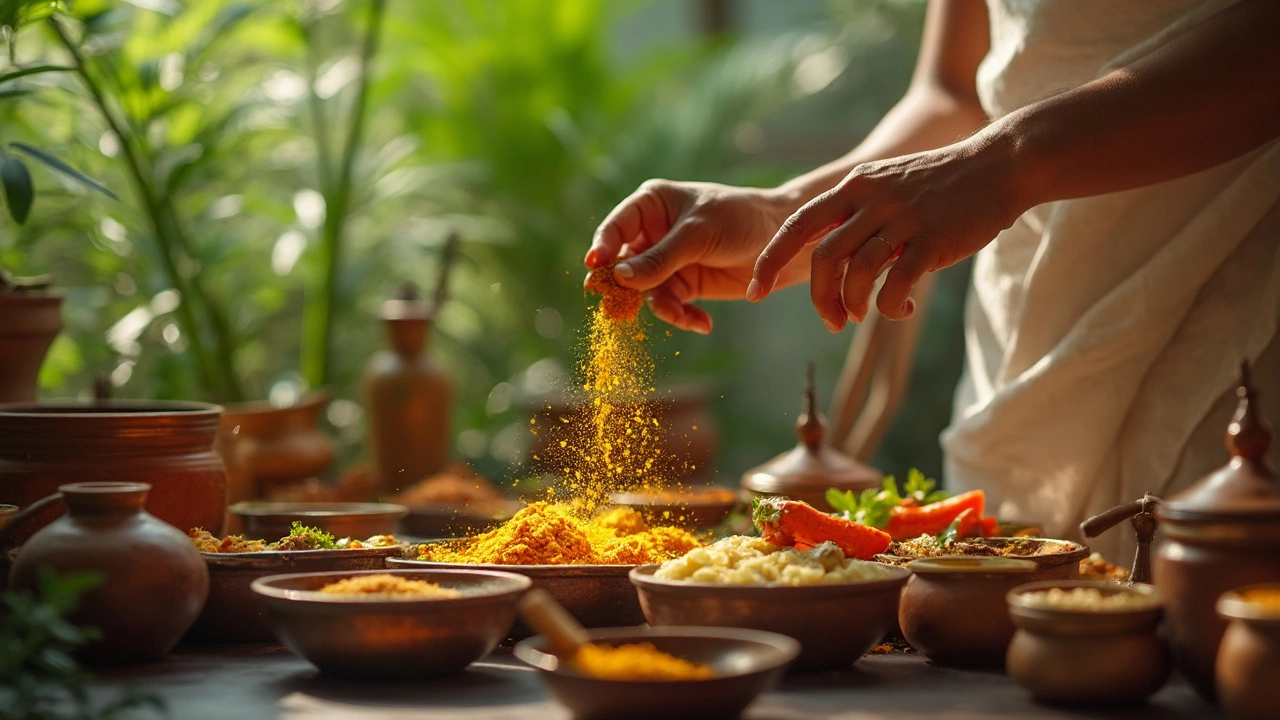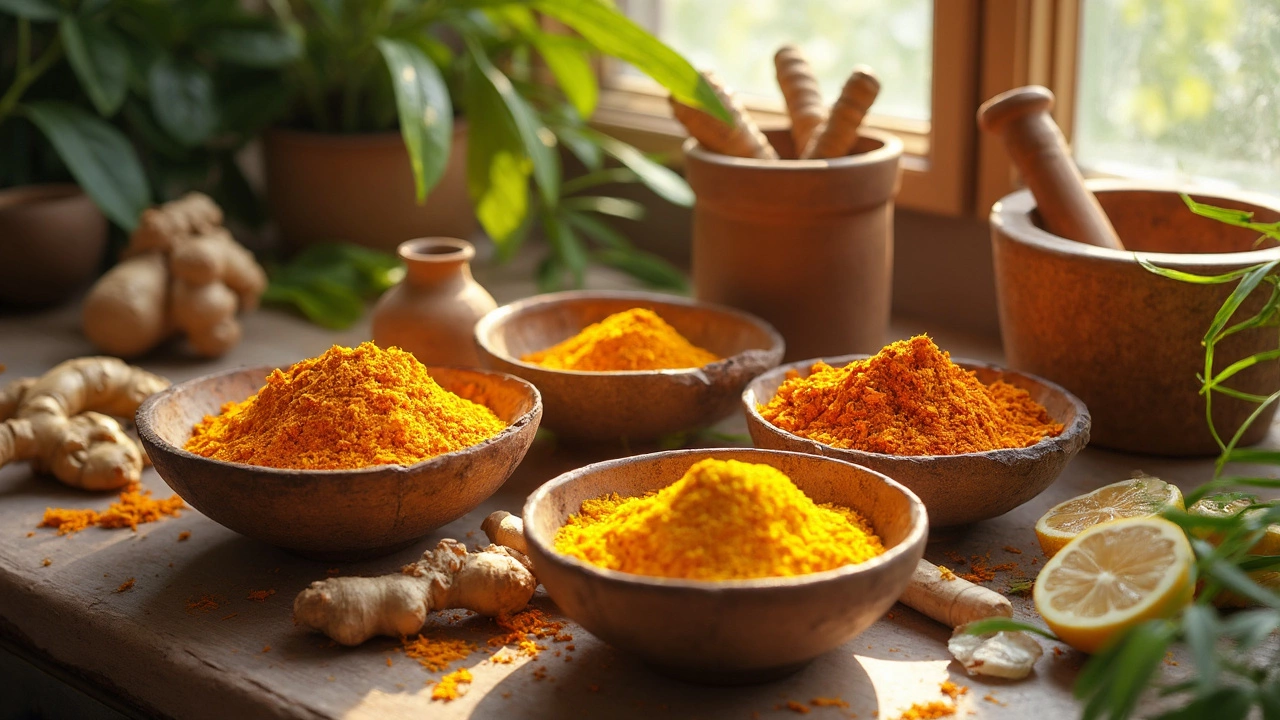Inflammation can be quite the pesky problem, right? It's like your body’s own little way of throwing a temper tantrum when it's ticked off. But we've got some good news—there are herbal supplements out there that can help calm things down naturally.
Let's start with turmeric. You might have heard it's the golden child of spices, and for good reason. It contains curcumin, which is known for its powerful anti-inflammatory effects. People have been using turmeric in traditional medicine for ages, and modern science backs up these claims with a ton of studies.
Then there's ginger, the spicy miracle worker. Not only does it add a zing to your meals, but also a punch to inflammation. It's been known to help with everything from sore muscles to joint pain. Plus, it’s easy to throw into a smoothie or salad.
- Understanding Inflammation
- Top Herbal Warriors
- Turmeric - The Golden Hero
- Ginger's Spicy Punch
- Safe Supplementation Tips
Understanding Inflammation
So, inflammation—what's up with that? Well, it’s your body's way of telling you something's wrong, like a fire alarm going off inside. It’s a natural part of the immune response, kicking in to fend off injuries and infections. But when inflammation sticks around longer than it's supposed to, it can cause trouble.
Think of inflammation as a double-edged sword. On one hand, it’s essential for healing—repairing damage and warding off harmful invaders like bacteria and viruses. On the other hand, when it becomes chronic, this once-helpful process can lead to pain and diseases such as arthritis, heart disease, or diabetes.
Acute vs. Chronic Inflammation
Here's the deal: inflammation comes in two flavors—acute and chronic. Acute inflammation is the good guy, a short-term response you'll see when you sprain your ankle or catch a cold. It's characterized by redness, swelling, and warmth as your body works to heal itself.
Chronic inflammation, however, is the not-so-welcome guest. It hangs around, sometimes without any obvious symptoms, and it's linked to a slew of health issues like autoimmune diseases and even cancer. It’s the kind of inflammation you'd want to tackle with herbal supplements tailored for inflammation relief.
Causes of Chronic Inflammation
- Prolonged exposure to irritants such as pollution or industrial chemicals.
- Poor diet full of processed foods and sugars.
- Lack of exercise or too much stress.
- Persistent infections or autoimmune diseases.
Understanding these causes can help you make lifestyle changes to manage the inflammatory response better. And here's where the natural remedies come into play, offering you a hand in keeping inflammation at bay without the side effects of conventional medications.
But remember, while herbal supplements can aid in reducing inflammation, they aren't a cure-all. It’s about finding the balance through the right mix of diet, exercise, stress management, and these natural aids.
Top Herbal Warriors
When it comes to fighting inflammation, nature’s got some true heavyweights. These top herbal supplements pack a serious punch and have been favorites for ages in various traditional remedies. Let's give a shout-out to some of these top contenders that can help you on your journey to reducing inflammation naturally.
Turmeric
We’ve already mentioned turmeric, but it really deserves the spotlight. Thanks to curcumin, this spice is a strong anti-inflammatory. People in India have used turmeric for its medicinal benefits for thousands of years. Though you’d have to consume it quite a bit in food to get the same benefits as supplements, it’s definitely worth considering.
Ginger
Ginger isn't just for settling your stomach. It contains gingerols and shogaols—which are fancy terms for compounds that help reduce inflammation. You've probably seen ginger in teas or candies meant to soothe nausea, but it does a lot more than that. Regularly consuming ginger could be a natural way to ease those stiff joints or sore muscles.
Green Tea
Who doesn’t love a warm cup of green tea? It's delicious and contains catechins, which are wonderful antioxidants that may also have anti-inflammatory perks. Adding a cup or two to your daily routine might not only calm your mind but also the inflammation in your body.
Boswellia Serrata
This might sound like a mouthful, but boswellia, or Indian frankincense, is fantastic. It’s been traditionally used for conditions like arthritis. Boswellic acids, the active components, are believed to hinder enzymes that cause inflammation. You can find boswellia in supplement form, making it easy to work into your routine.
| Supplement | Key Component | Potential Benefit |
|---|---|---|
| Turmeric | Curcumin | Anti-inflammatory, antioxidant |
| Ginger | Gingerols | Reduces muscle pain |
| Green Tea | Catechins | Anti-inflammatory, heart health |
| Boswellia Serrata | Boswellic Acids | Reduces joint pain |
These supplements are generally well-tolerated, but it’s always smart to chat with a healthcare provider before diving into herbal remedies, especially if you’re already on medication. What works for one person might not work for another, so it’s all about finding what suits you and your lifestyle best.

Turmeric - The Golden Hero
Turmeric isn't just a bright yellow powder sitting in your spice rack. It's a powerhouse of anti-inflammatory properties and has been used in Ayurvedic medicine for centuries. What makes turmeric a standout when it comes to tackling inflammation is its active ingredient—curcumin.
Why Curcumin is King
Curcumin is the magic bullet found in turmeric. It’s like having a heavyweight champion in your corner fighting off inflammation. The thing is, our bodies don't absorb curcumin all that well on its own. But pair it with black pepper, which contains piperine, and absorption can skyrocket by a staggering 2000%. So, next time you get your turmeric fix, throw in a dash of pepper for good measure.
Research Backs It Up
You might be wondering if there’s any solid science behind these claims. You bet there is! Studies have shown that turmeric can be as effective as some anti-inflammatory drugs, minus the side effects. It's like Mother Nature’s own prescription.
Easy Ways to Include Turmeric in Your Diet
- Add it to curries or rice dishes for a flavor bump.
- Make a turmeric tea by steeping the powder in hot water with honey and lemon.
- Blend it into smoothies or soups.
- Sprinkle a bit into your scrambled eggs for a vibrant twist.
If you're looking for a supplement, consider choosing one with added black pepper extract, or look for liposomal formulations, which also boost absorption.
Is there an ideal dose? A typical dose of curcumin can range from 500 to 2000 mg per day, depending on your situation, but it's always wise to start small and consult with a healthcare provider.
Ginger's Spicy Punch
Ginger isn’t just for calming your stomach or adding flavor to your stir-fry. It’s a real champ when it comes to combatting inflammation. This fiery root, scientifically known as Zingiber officinale, is packed with compounds called gingerols and shogaols. These bad boys are what give ginger its powerful anti-inflammatory and antioxidant effects.
So, how exactly does ginger do its magic? Basically, it messes with the inflammation process. This root can inhibit the production of excessive free radicals which often lead to inflammation, especially in conditions like arthritis. Studies have shown that people consuming ginger reported significant reductions in knee pain, especially after walking. How cool is that?
Ways to Include Ginger in Your Diet
If you’re wondering how to work ginger into your diet, it’s easier than you might think. Here are some simple ideas:
- Ginger Tea: Just steep a few slices of fresh ginger in hot water. Add a squirt of lemon or a dash of honey if you fancy.
- Smoothies: A small piece of ginger can be blended into your morning smoothie for that extra kick and natural inflammation relief.
- Cooking: Grated ginger can add great flavor to soups, stir-fries, or curries, bringing taste and health benefits in one go!
- Supplements: If fresh ginger isn’t your thing, you can also find ginger in capsule form at most health stores.
Safety Notes
Like all good things, too much ginger might cause some unwanted side effects like heartburn or an upset stomach. Most experts suggest sticking with about four grams of ginger a day, but it's always a good idea to chat with your doc, especially if you're pregnant or on blood-thinning meds.
To wrap it up, ginger might just be that natural remedy you’ve been looking for to punch inflammation in its tracks. Whether you’re sipping some ginger tea or adding it to your favorite dish, this spicy hero can be a flavorful way to boost your health.

Safe Supplementation Tips
Alright, so you’re keen to jump on the herbal supplements train for tackling inflammation. But hold on, it's crucial to do it safely. Don’t worry, I've got you covered with some practical tips to ensure you're getting the benefits without any unwanted side effects.
Start Slow, Increase Gradually
When adding any new supplement, especially powerful ones like turmeric or ginger, it’s best to start with a low dose. Your body needs time to adjust, so consider starting with half the recommended dose and slowly increase it once you’re sure it sits well with you.
Consult with Your Doctor
If you’re already on medication or have underlying health issues, definitely give your healthcare provider a heads-up. Some herbal supplements can interact with medications or affect certain conditions, so a quick chat with your doctor can prevent any unwanted surprises.
Read Labels Carefully
Not all supplements are created equal. Be sure to check the labels for active ingredient concentrations. If you’re going for turmeric, look for a supplement with a high percentage of curcumin. Also, many supplements add black pepper extract (piperine) because it helps with absorption.
Observe Your Body
Everyone's body reacts differently. Pay close attention to how you feel after starting a new herbal supplement. If you notice any adverse reactions, it might be a cue to stop or try a different brand or dosage.
Mind the Uppers
Some herbal supplements are known to have stimulating effects. Ginger, for instance, might perk you up, so perhaps keep it off your evening list if you don’t want to mess with your sleep schedule.
Bonuses: Here's a quick overview of what typical doses look like:
| Supplement | Recommended Daily Dose |
|---|---|
| Turmeric Extract | 500-1000 mg |
| Ginger Root | 250-500 mg |
Remember, the journey to reducing inflammation and finding the right natural remedies is personal. Take it step by step, and always put safety at the forefront.

 IVF Cost per Cycle: How Much Does One Round Really Cost?
IVF Cost per Cycle: How Much Does One Round Really Cost?
 What Is a Vata Person Like? Ayurvedic Traits, Behaviors, and Daily Balance Tips
What Is a Vata Person Like? Ayurvedic Traits, Behaviors, and Daily Balance Tips
 Navigating Boundaries: Sharing Wisely with Your Therapist
Navigating Boundaries: Sharing Wisely with Your Therapist
 How Long Does Heart Surgery Take? Timing, Tips, and What to Expect
How Long Does Heart Surgery Take? Timing, Tips, and What to Expect
 Essential Advice: Navigating Conversations with Your Pain Management Doctor
Essential Advice: Navigating Conversations with Your Pain Management Doctor